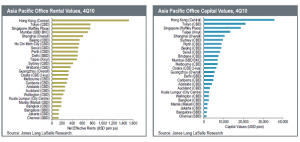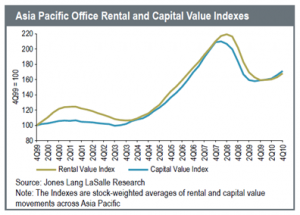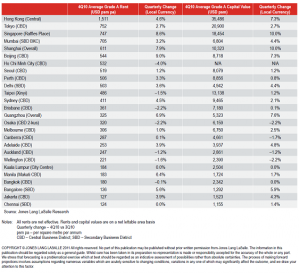 New research from Jones Lang LaSalle reveals that positive business sentiment and solid corporate hiring are buoying leasing demand in the office markets of Asia Pacific. In 2010, aggregate net take-up across major Tier I markets was more than double the level of the previous year.
New research from Jones Lang LaSalle reveals that positive business sentiment and solid corporate hiring are buoying leasing demand in the office markets of Asia Pacific. In 2010, aggregate net take-up across major Tier I markets was more than double the level of the previous year.
Vacancies have stabilised or started to trend down in many cities and more markets moved to the upturn phase of the rental cycle in 4Q10. Of the 26 featured office markets, 17 saw an increase in net effective rents during the quarter. In the previous quarter, 12 markets recorded an increase in rents. Rental growth is accelerating, with an average quarter-on-quarter increase across the region of 3.1%. In 3Q10, quarterly rental growth averaged 1.8%.
Beijing recorded the largest quarterly rental growth of 9.0% in 4Q10, while rents in Shanghai grew by 7.9%, with the result for both markets being driven by strong spatial demand from MNCs and domestic corporates. Rents in Singapore grew by 8.6% q-o-q, underpinned by a temporary shortage of space. Hong Kong saw a further 4.6% increase on the back of a tight supply situation and solid demand by the financial sector. On an annual basis, Hong Kong led the way across the region, recording a strong 33% increase in rents.
In a few markets where tenant demand remains weak, rents are generally beginning to stabilise or grow moderately. For  example, in Kuala Lumpur and Bangkok, rents remained stable in 4Q10 while in Tokyo, rents rose by 2.7% q-o-q as withdrawal of leasing incentives helped offset some residual declines in gross rentals. Rents in Australia and New Zealand saw moderate movements, both positive and negative during the quarter.
example, in Kuala Lumpur and Bangkok, rents remained stable in 4Q10 while in Tokyo, rents rose by 2.7% q-o-q as withdrawal of leasing incentives helped offset some residual declines in gross rentals. Rents in Australia and New Zealand saw moderate movements, both positive and negative during the quarter.
Jeremy Sheldon head of markets for Jones Lang LaSalle in Asia Pacific says, “the pick up in demand is broad based, and increasingly includes the local corporate sector, especially in China and India. MNC’s seeking global growth opportunities are in the market as well as some new entrants. These trends will continue into 2011 barring any economic or political turbulence. This demand will exacerbate rental increases in markets where vacancy is already low.”
Consistent with strong fundamentals, we expect leasing demand to remain solid and vacancies to generally trend down over the next few quarters. Driven by improving occupancy levels, the regional office market is now largely landlord favourable. Rental growth of up to 30% is expected across the region this year, with the strongest growth likely to be seen in supply constrained markets. However, there will be significant variations across markets, with a few laggards that are likely to see little, if any, growth.
Across the region, the average quarterly increase in capital values in 4Q10 was 3.2%, compared with 2.8% in 3Q10. Again Hong Kong outperformed over the year, recording a 36% increase in capital values on the back of strong buying activity, largely by local investors.
Stuart Crow head of Capital Markets for Jones Lang LaSalle in Asia Pacific comments, “Investors are in a confident mood, and capital values have recovered ahead of rents in most markets in anticipation of good growth. We are expecting investment volumes in Asia Pacific to rise by a further 20-25% in 2011 with improvements in the leasing markets helping buoy investor confidence. Companies are poised to start spending again but shortages of quality space will emerge, causing a shift to landlord favourable market conditions in Asia Pacific.”
 Almost all major markets saw either stable or increasing capital values. The largest quarter-on- quarter increase was recorded in Singapore and Shanghai, both increasing by 10.0%. Hong Kong, Beijing and Guangzhou followed closely with quarterly increases of about 7.5%. Across the region, the average quarterly increase in capital values in 4Q10 was 3.2%, compared with 2.8% in 3Q10. Again Hong Kong outperformed over the year, recording a 36% increase in capital values on the back of strong buying activity, largely by local investors.
Almost all major markets saw either stable or increasing capital values. The largest quarter-on- quarter increase was recorded in Singapore and Shanghai, both increasing by 10.0%. Hong Kong, Beijing and Guangzhou followed closely with quarterly increases of about 7.5%. Across the region, the average quarterly increase in capital values in 4Q10 was 3.2%, compared with 2.8% in 3Q10. Again Hong Kong outperformed over the year, recording a 36% increase in capital values on the back of strong buying activity, largely by local investors.
Capital values are expected to increase in nearly all markets during 2011, by up to 25%, as rental performance and investor confidence further improve. Markets expected to see the largest growth include Hong Kong, Tokyo, Singapore and the China Tier I cities.





